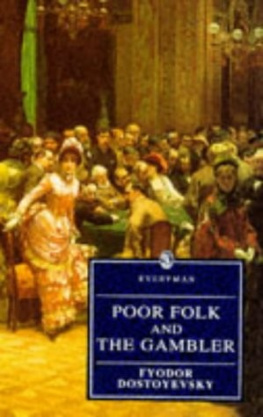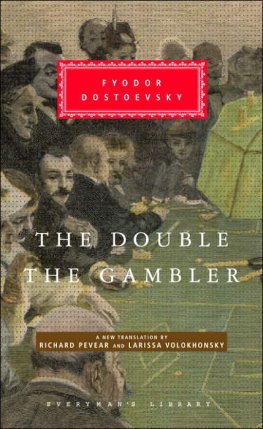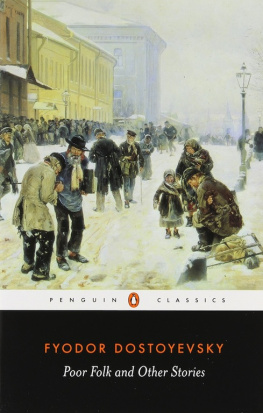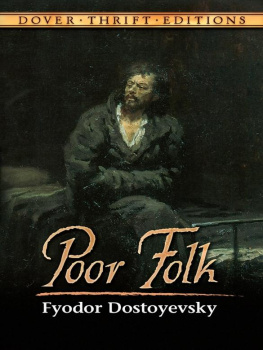
Poor Folk
by Fyodor Dostoyevsky
Chapter 1
April 8 th
MY DEAREST BARBARA ALEXIEVNA,How happy I was last nighthow immeasurably, how impossibly happy! That was because for once in your life you had relented so far as to obey my wishes. At about eight o'clock I awoke from sleep (you know, my beloved one, that I always like to sleep for a short hour after my work is done)I awoke, I say, and, lighting a candle, prepared my paper to write, and trimmed my pen. Then suddenly, for some reason or another, I raised my eyesand felt my very heart leap within me! For you had understood what I wanted, you had understood what my heart was craving for. Yes, I perceived that a corner of the curtain in your window had been looped up and fastened to the cornice as I had suggested should be done; and it seemed to me that your dear face was glimmering at the window, and that you were looking at me from out of the darkness of your room, and that you were thinking of me. Yet how vexed I felt that I could not distinguish your sweet face clearly! For there was a time when you and I could see one another without any difficulty at all. Ah me, but old age is not always a blessing, my beloved one! At this very moment everything is standing awry to my eyes, for a man needs only to work late overnight in his writing of something or other for, in the morning, his eyes to be red, and the tears to be gushing from them in a way that makes him ashamed to be seen before strangers. However, I was able to picture to myself your beaming smile, my angelyour kind, bright smile; and in my heart there lurked just such a feeling as on the occasion when I first kissed you, my little Barbara. Do you remember that, my darling? Yet somehow you seemed to be threatening me with your tiny finger. Was it so, little wanton? You must write and tell me about it in your next letter.
But what think you of the plan of the curtain, Barbara? It is a charming one, is it not? No matter whether I be at work, or about to retire to rest, or just awaking from sleep, it enables me to know that you are thinking of me, and remembering methat you are both well and happy. Then when you lower the curtain, it means that it is time that I, Makar Alexievitch, should go to bed; and when again you raise the curtain, it means that you are saying to me, "Good morning," and asking me how I am, and whether I have slept well. "As for myself," adds the curtain, "I am altogether in good health and spirits, glory be to God!" Yes, my heart's delight, you see how easy a plan it was to devise, and how much writing it will save us! It is a clever plan, is it not? And it was my own invention, too! Am I not cunning in such matters, Barbara Alexievna?
Well, next let me tell you, dearest, that last night I slept better and more soundly than I had ever hoped to do, and that I am the more delighted at the fact in that, as you know, I had just settled into a new lodginga circumstance only too apt to keep one from sleeping! This morning, too, I arose (joyous and full of love) at cockcrow. How good seemed everything at that hour, my darling! When I opened my window I could see the sun shining, and hear the birds singing, and smell the air laden with scents of spring. In short, all nature was awaking to life again. Everything was in consonance with my mood; everything seemed fair and spring-like. Moreover, I had a fancy that I should fare well today. But my whole thoughts were bent upon you. "Surely," thought I, "we mortals who dwell in pain and sorrow might with reason envy the birds of heaven which know not either!" And my other thoughts were similar to these. In short, I gave myself up to fantastic comparisons. A little book which I have says the same kind of thing in a variety of ways. For instance, it says that one may have many, many fancies, my Barbarathat as soon as the spring comes on, one's thoughts become uniformly pleasant and sportive and witty, for the reason that, at that season, the mind inclines readily to tenderness, and the world takes on a more roseate hue. From that little book of mine I have culled the following passage, and written it down for you to see. In particular does the author express a longing similar to my own, where he writes:
"Why am I not a bird free to seek its quest?"
And he has written much else, God bless him!
But tell me, my lovewhere did you go for your walk this morning? Even before I had started for the office you had taken flight from your room, and passed through the courtyardyes, looking as vernal-like as a bird in spring. What rapture it gave me to see you! Ah, little Barbara, little Barbara, you must never give way to grief, for tears are of no avail, nor sorrow. I know this wellI know it of my own experience. So do you rest quietly until you have regained your health a little. But how is our good Thedora? What a kind heart she has! You write that she is now living with you, and that you are satisfied with what she does. True, you say that she is inclined to grumble, but do not mind that, Barbara. God bless her, for she is an excellent soul!
But what sort of an abode have I lighted upon, Barbara Alexievna? What sort of a tenement, do you think, is this? Formerly, as you know, I used to live in absolute stillnessso much so that if a fly took wing it could plainly be heard buzzing. Here, however, all is turmoil and shouting and clatter. The plan of the tenement you know already. Imagine a long corridor, quite dark, and by no means clean. To the right a dead wall, and to the left a row of doors stretching as far as the line of rooms extends. These rooms are tenanted by different peopleby one, by two, or by three lodgers as the case may be, but in this arrangement there is no sort of system, and the place is a perfect Noah's Ark. Most of the lodgers are respectable, educated, and even bookish people. In particular they include a tchinovnik (one of the literary staff in some government department), who is so well-read that he can expound Homer or any other authorin fact, anything, such a man of talent is he! Also, there are a couple of officers (for ever playing cards), a midshipman, and an English tutor. But, to amuse you, dearest, let me describe these people more categorically in my next letter, and tell you in detail about their lives. As for our landlady, she is a dirty little old woman who always walks about in a dressing-gown and slippers, and never ceases to shout at Theresa. I myself live in the kitchenor, rather, in a small room which forms part of the kitchen. The latter is a very large, bright, clean, cheerful apartment with three windows in it, and a partition-wall which, running outwards from the front wall, makes a sort of little den, a sort of extra room, for myself. Everything in this den is comfortable and convenient, and I have, as I say, a window to myself. So much for a description of my dwelling-place. Do not think, dearest, that in all this there is any hidden intention. The fact that I live in the kitchen merely means that I live behind the partition wall in that apartmentthat I live quite alone, and spend my time in a quiet fashion compounded of trifles. For furniture I have provided myself with a bed, a table, a chest of drawers, and two small chairs. Also, I have suspended an ikon. True, better rooms may exist in the world than thismuch better rooms; yet comfort is the chief thing. In fact, I have made all my arrangements for comfort's sake alone; so do not for a moment imagine that I had any other end in view. And since your window happens to be just opposite to mine, and since the courtyard between us is narrow and I can see you as you pass,why, the result is that this miserable wretch will be able to live at once more happily and with less outlay. The dearest room in this house costs, with board, thirty-five roublesmore than my purse could well afford; whereas MY room costs only twenty-four, though formerly I used to pay thirty, and so had to deny myself many things (I could drink tea but seldom, and never could indulge in tea and sugar as I do now). But, somehow, I do not like having to go without tea, for everyone else here is respectable, and the fact makes me ashamed. After all, one drinks tea largely to please one's fellow men, Barbara, and to give oneself tone and an air of gentility (though, of myself, I care little about such things, for I am not a man of the finicking sort). Yet think you that, when all things needfulboots and the resthave been paid for, much will remain? Yet I ought not to grumble at my salary,I am quite satisfied with it; it is sufficient. It has sufficed me now for some years, and, in addition, I receive certain gratuities.
Next page










